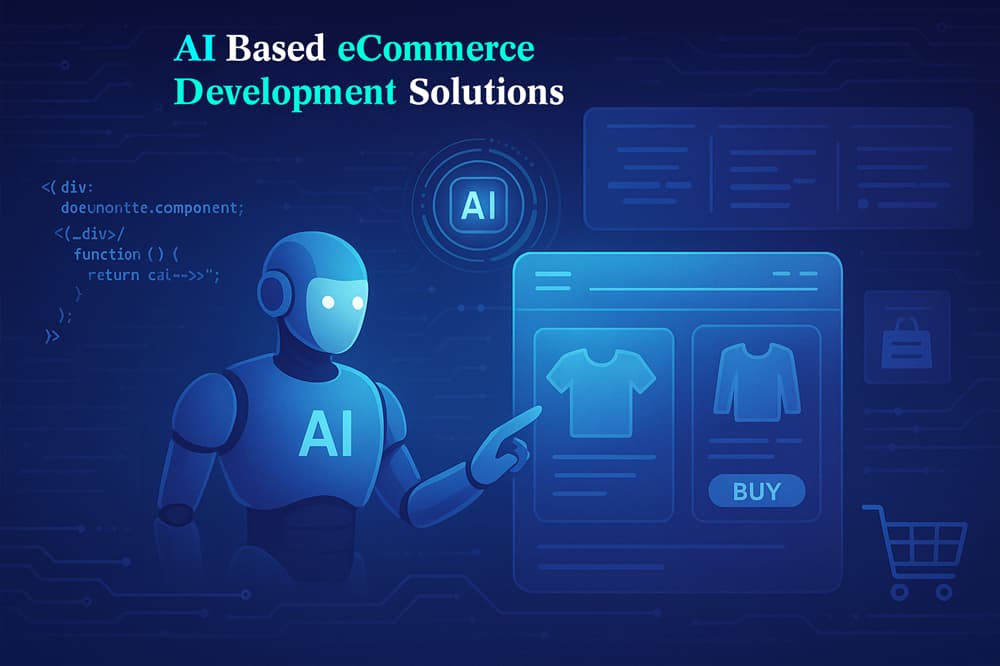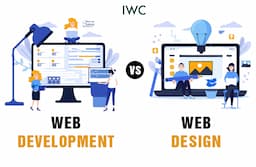AI Based eCommerce Development Solutions

The year 2025 shall be a turning point in the history of Artificial Intelligence in the course of business. What was once an idea of the future or something to toy with, AI has established itself as a mandatory part of operations and a foundation of digital revolution within the industries. Businesses are not simply adopting AI; they are already re-architecting their business models and business processes around AI, no longer relying merely on automated processes, but transforming and creating the strategy and business-decision-making provision.
This elaborate content tells the future of AI in business in 2025, the major trends, major impacts, and the emerging challenges and opportunities that are to be faced. The 2025 eCommerce environment is taking a revolutionary turn with major changes being motivated by the fact that Artificial Intelligence is deeply penetrating the system.
It started as a way to offer basic suggestions and has turned into the foundation of what is personalized shopping experience, extreme efficiency and anticipatory business planning. Companies that do not adopt the AI-driven eCommerce development platforms will also find themselves losing touch in the highly competitive market.
What is Artificial Intelligence for eCommerce Development?
The term eCommerce Artificial Intelligence (AI) development can be discussed as the use of AI, machine learning (ML), natural language processing (NLP), computer vision and other state-of-the-art cognitive technologies to accelerate, improve and streamline various activities in online commerce. It implies the inclusion of AI-based functions both in the backend of eCommerce-related operations and in the front-end experience of customers.
Basically, eCommerce websites that use AI enable machines to handle activities that normally only involved the intelligence of a person, including reasoning, learning, and predicting, and decision-making. Examining huge volumes of data (such as clicks, purchases, Browse history, product interactions and supply chain activity), AI systems will be connected to make smart real-time decisions, which result in efficiency, personalization and lastly, sales. This makes online shopping experience more natural, time-saving and personalized thus making the end product a more entertaining and lucrative web store.
Business Benefits of AI in eCommerce Development
Whether eCommerce is developed based on AI or not, dozens of practical advantages will extend the application of the technology to businesses:
2. Better Demand Forecasting and Inventory Management; AI systems can forecast demand in an accurate manner considering the previous sales data along with seasonality, market trends, and promotional activities, and even non-market factors such as weather. This assists companies to eliminate stockouts as well as overstocking, the possibility of optimal inventory and reduced holding costs and availability of the products at the exact time when the customer requires them. The resultant effect is an efficient warehousing and improved supply chain efficiency.
3. Artificial and Smart Customer Service: Virtual assistants and chatbots powered by AI offer 24/7 assistance, addressing routine questions, processing orders, tracking shipments, and even resolving minor problems. This means the burden on human customer service staff is minimized, response times are faster, and customer satisfaction is increased overall. Contemporary AI-powered eCommerce customer service solutions are conversational in nature and context-aware.
4. Optimized Pricing Models (Dynamic Pricing): AI facilitates real-time dynamic pricing. It considers the competitor's prices, demand, inventory, customer loyalty, and other marketplace variables to dynamically manipulate product prices to remain competitive and drive highest profitability.
5. Improved Product Search and Discovery: AI-driven search algorithms do more than keyword matching. They interpret the intent of the customer, even with ambiguous queries, and can recommend complementary products. Visual and voice search functionality, where a customer can upload an image or simply say their query, immensely enhances product discovery and user experience.
6. Fraud Detection and Security: AI systems constantly track transactions and user behavior in order to identify anomalies and flag suspicious activity in real time. This fortifies security, safeguards sensitive customer data, and fosters trust.
7. Efficient Marketing Campaigns: AI maximizes marketing campaigns by segmenting customers, forecasting behavior, and customizing ad targeting. It facilitates data-driven, personalized campaigns, maximizes ad spend, and creates more targeted ads to the right audience for increased engagement and lower customer acquisition costs. AI can further help to write ad copy and creative.
8. Automated Content Generation: Generative AI can be used to generate product descriptions, marketing text, social media posts, and even product images, saving a lot of time and effort in creating content.
9. Predictive Analytics for Business Decision-Making: AI offers rich insights into customer behavior, market trends, and operational efficiencies, enabling businesses to make more informed and proactive strategic choices.
eCommerce development solutions with AI Technology
Integrating AI solutions for eCommerce encompasses a range of technologies and applications:
2. AI-Powered Chatbots and Virtual Assistants: Using Natural Language Processing (NLP) and Machine Learning (ML), they offer real-time customer support, assist in the shopping process, and answer frequently asked questions (FAQs). Some can even take orders or help with returns.
3. Visual Search and Voice Search: • Visual Search (Computer Vision): Enables customers to upload a picture (e.g., a photo of a dress they are interested in) to identify similar items within the inventory of the store. • Voice Search (Speech Recognition/NLP): Allows customers to search for products through voice commands, providing a convenient and intuitive shopping experience.
4. Predictive Analytics for Demand and Inventory: ML algorithms process past data, market trends, and outside factors to predict demand effectively, maximize stock levels, and automate reordering.
5. Dynamic Pricing Algorithms: AI systems constantly watch competitor pricing, demand elasticity, inventory levels, and other market factors to dynamically vary product prices in real-time for optimal revenue and profit.
6. Fraud Detection Systems: AI algorithms detect suspicious patterns in transactions, user patterns, and payment data to alert and block fraudulent transactions.
7. Customer Segmentation and Behavioral Analysis: AI breaks down customers into extremely precise segments by behavior, likes and dislikes, and demographics, allowing highly targeted campaigns and tailored experiences.
8. Automated Personalization and Marketing Platforms: AI systems are incorporated into CRM and marketing automation platforms to provide personalized email, push, and onsite experiences based on the specific journey of an individual user.
9. Generative AI Content Generation: Software using large language models (LLMs) can generate product descriptions, marketing text, ad copy, and even help generate product images or virtual try-on.
10. AI Supply Chain Optimization: AI forecasts potential disruptions, optimizes route planning, warehouse automation (e.g., robotic picking), and increases supply chain visibility and resiliency.
Top most used ecommerce websites where AI use
Most of the big eCommerce players have been using AI for years, and they have become the benchmark for the entire industry.
2. Alibaba: Utilizes AI heavily for personalized recommendations, intelligent customer support (e.g., their chatbot 'AliMe'), intelligent logistics, and supply chain optimization, particularly for its large network of global suppliers and purchasers.
3. Netflix (although not eCommerce per se, its recommendation system is an excellent example): Although not eCommerce in the classical sense, Netflix's AI-driven recommendation system for TV shows and films is a masterclass in personalization and maintaining users engaged and subscribed.
4. eBay: Uses AI to enhance search relevance, personalized listings, fraud prevention, and image recognition for product categorization.
5. Myntra (India): An Indian fashion eCommerce leader, Myntra utilizes AI for personalized suggestions, visual search (users can upload photos of their outfit to get similar items), and size suggestions.
6. Zara: Applies AI for forecasting demand, inventory control, and optimizing their fast-fashion supply chain in order to rapidly keep up with trends.
7. Walmart: Uses AI for predictive inventory, store layout optimization, shopping experience personalization (online and offline), and supply chain optimization.
These platforms showcase the enormous potential of AI development in e-commerce in crafting seamless, efficient, and highly engaging shopping experiences.
AI eCommerce Website Design and Development Tools & Platforms
There are numerous tools and platforms in the market that combine AI to make AI-based e-commerce website design and development a streamlined process:
1. Built-in AI eCommerce Platforms:
• Shopify: Provides many AI apps and integrations via its app store for product recommendations, chatbots, marketing automation, and content creation. Shopify itself is increasingly integrating AI into its native features for tasks such as product description generation, image editing, and personalization.
• Wix: Offers an AI website builder that has the capability to create original designs and write SEO copy from basic prompts. It also offers AI tools for image editing, product descriptions, and email marketing.
• Adobe Commerce (Magento): Provides AI features for personalization, product recommendations, search, and business intelligence with its Sensei AI technology.
• Salesforce Commerce Cloud: Employs Einstein AI for personalized recommendations, predictive analytics, and smart merchandising.
2. Dedicated AI Tools & Solutions:
• Recommendation Engines: Algolia, Bloomreach, Nosto, Clerk.io, Vue.ai.
• Chatbots & Conversational AI: HubSpot, Zendesk, Landbot, Tidio, Octane AI.
• Dynamic Pricing Tools: Pricer24, Prisync, Minderest.
• Fraud Detection: Sift, Riskified.
• Content Generation: Jasper, Copy.ai, Writesonic (for product descriptions, ad copy).
• Visual Search: Clarifai, Google Cloud Vision AI, Gumlet.
• Inventory & Demand Forecasting: Blue Yonder, GEP, Oracle.
3. Cloud AI Services:
• Google Cloud AI: Provides different AI services such as Vision AI, Natural Language API, Recommendation AI, and AutoML to develop customized AI models.
• Amazon Web Services (AWS) AI/ML: Offers a wide range of AI services such as Amazon Personalize, Amazon Polly (text-to-speech), Amazon Rekognition (video/image analysis), and Amazon SageMaker for developing and deploying machine learning models.
• Microsoft Azure AI: Provides services such as Azure Cognitive Services (vision, speech, language), Azure Machine Learning, and Azure Bot Service.
These platforms and tools enable businesses even with limited in-house AI skill to deploy advanced AI solutions in eCommerce.
How Can You Use AI in E-Commerce?
AI can be integrated into nearly every aspect of your eCommerce business:
1. Personalized Shopping Experiences:
• Product Recommendations: Show "Customers also bought," "Related items," or "You might like" areas based on real-time Browse, purchase history, and demographics.
• Dynamic Content: Display personalized homepage designs, landing pages, and banners based on user segments or individual interests.
• Personalized Search Results: Re-rank search results based on user size, color, brand, etc. preferences.
2. Automated Customer Support:
• 24/7 Chatbots: Answer frequently asked questions, offer order status, assist in product selection, and handle returns/exchanges.
• Virtual Shopping Assistants: Provide interactive advice, fashion tips (fashion), or product comparisons.
3. Optimized Marketing and Sales:
• Targeted Ads: Employ AI to determine high-potential customer segments for social media and search engine ads.
• Email Marketing Automation: Deliver targeted product recommendations, abandoned cart alerts, and special offers.
• Lead Scoring: AI marks leads that are most likely to convert, enabling sales teams to focus on them.
4. Efficient Operations:
• Inventory Management: Forecast demand to manage stock levels, avoid overstocking or stockouts.
• Supply Chain Optimization: Optimize shipping routes, logistics management, and anticipate potential disruptions.
• Warehouse Automation: Leverage AI-driven robotics for picking, packing, and sorting.
5. Fraud Prevention:
• Real-time Monitoring: AI identifies suspicious transactions or user behavior patterns that suggest potential fraud.
6. Product Development and Content Creation:
• Trend Analysis: AI is able to analyze huge volumes of data (social media, search trends, competitor products) to detect emerging product trends.
• Automated Product Descriptions: Create unique and SEO-optimized product descriptions, titles, and tags.
• Image Optimization: Utilize AI to eliminate backgrounds, enhance product photos, or produce lifestyle photography.
The Future of AI in eCommerce development
The way forward for AI development in e-commerce is towards increasingly intelligent, glitch-free, and human-like engagements.
• Hyper-Agentic Shopping: Future eCommerce stores powered by AI could include "AI shopping agents" that not just suggest but can make purchases independently on customers' behalf as per their preferences, budget, and current needs on different platforms.
• Genuinely Immersive Experiences: AR/VR integration will be more prevalent, providing virtual try-on experiences, 3D visualization of products, and interactive virtual showrooms driven by AI to tailor the environment.
• Predictive Shopping: AI will predict customer needs before they even express them, suggesting products or services ahead of time based on life events, environmental conditions, or even biometric signals (with permission).
• AI-Driven Supply Chain Autonomy: Supply chains will be nearly completely self-optimizing, with AI systems taking complete control of inventory, logistics, and even supplier relationships, responding to disruption in real-time.
• Sophisticated Conversational Commerce: Voice and chat will be the primary interfaces. AI will be able to comprehend complex, multi-turn conversations, manage subtle emotions, and offer extremely sophisticated, personalized assistance that feels barely distinguishable from human interaction.
• Ethical AI and Trust: With increasing power of AI, the focus on explainable AI (XAI), mitigation of bias, and strong ethical AI frameworks will be critical in order to establish and sustain consumer trust. Regulations will be updated to keep up with the changing technology.
• AI-Powered Micro-Personalization at Scale: Taking micro-personalization beyond segments, AI will provide "segment of one" personalization, where each and every customer interaction is distinct and dynamically optimized.
Potential risks of ai development in ecommerce website design
Though undeniable are the advantages, AI-driven e-commerce website design also has possible dangers that companies need to confront:
• Data Privacy and Security Risks: AI solutions are greatly dependent upon large sets of customer data. This creates extreme concerns regarding data leaks, mishandling of personal data, and adherence to privacy laws such as GDPR or India's future data protection legislations.
• Algorithmic Discrimination and Bias: Machine learning models are learned from past data, which at times may mirror current socio-cultural biases. If not adequately controlled, this can result in discriminatory recommendations, prices, or even fraud detection (e.g., disproportionately penalizing some groups).
• High Maintenance and Implementation Costs: Creating and implementing advanced AI eCommerce solutions can be costly, involving hefty initial technology, infrastructure, and specialized human capital investments. Maintenance, updates, and optimizations also contribute to the cycle of ongoing expenses.
• Technical Malfunctions and "Hallucinations": As with any technology, AI systems may malfunction, produce errors, or "hallucinate" (produce flawed yet believable data). Technical failures can impede operations, generate lost sales, or harm brand reputation.
• Job Displacement: AI-driven automation, especially in customer support, content generation, and simple data analysis, has raised questions about possible displacement of human jobs.
• Lack of Transparency and Explainability: For intricate AI models (especially deep learning models), it may not be easy to perceive "why" a specific decision or suggestion was produced. This "black box" issue can stall trust, accountability, and debugging.
• Over-Personalization and "Filter Bubbles": Personalization is advantageous, but excessive personalization can result in "filter bubbles," restricting customers from being exposed to new products or experiences, thus possibly inhibiting discovery or even resulting in a feeling of being spied on.
• Ethical Concerns: The capacity of AI to drive consumer behavior creates ethical issues regarding manipulation, rightful advertising, and business goal vs. consumer welfare balance.
• Integration Challenges: Merging AI solutions with current legacy eCommerce platforms and back-end systems may be challenging, time-consuming, and technologically demanding.
Current Statatics of AI in ecommerce
The present state of AI in eCommerce is characterized by frenetic growth and growing use:
1. Market Size: The market for AI in retail was worth about $5.9 billion in 2022 and is expected to reach $55.5 billion by 2030, with a strong CAGR of 28.7%. The AI-based eCommerce solutions market in particular is worth about $8.65 billion in 2025 and is expected to reach about $22.60 billion by 2032 at a CAGR of 14.60%.
2. Adoption Rates: A majority of internet retailers (approximately 80%) are applying AI technology to their eCommerce business either on a full or trial basis. A 2023 IBM report stated 79% of retail and consumer products organizations are actively deploying or piloting AI.
3. Revenue Uplift: Retailers that adopt AI-driven solutions achieve an average revenue boost of 19%. Specifically:
• Product recommendation engines: 15-30% revenue lift.
• AI-powered price optimization: 10-15% margin increase.
• Personalized marketing campaigns: 20-30% higher conversion rates.
4. Consumer Expectations: An important 70% of consumers today expect retailers to deliver AI-driven personalized experiences, with 63% saying they're more likely to buy from brands that have such experiences.
5. Chatbot Adoption: Virtual assistants and chatbots presently manage about 68% of retail customer service interactions end-to-end without any human involvement, an extraordinary jump from past years. 80% of retail and eCommerce companies either deploy AI chatbots or will soon.
6. Inventory Optimization: Retailers who deploy AI-based inventory management systems observe:
• 30% drop in stockouts.
• 25% drop in overstocking.
• 20-50% decrease in forecast error.
7. Generative AI Investment: 89.6% of Fortune 1000 organizations are expanding investment in generative AI.
These facts unequivocally show that AI for eCommerce sites is no longer an indulgence but a strategic necessity, bringing meaningful enhancement in customer experience, efficiency in operations, and income generation globally with India emerging as a base for AI solutions for eCommerce at a fast pace.
Recent Blogs

The Ultimate Checklist for Selecting a Website Development Agency

Difference Between Web Design and Web Development
